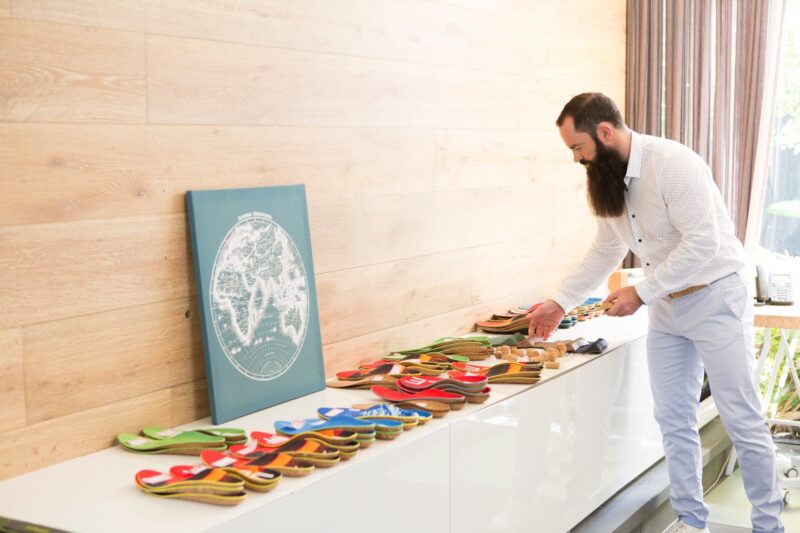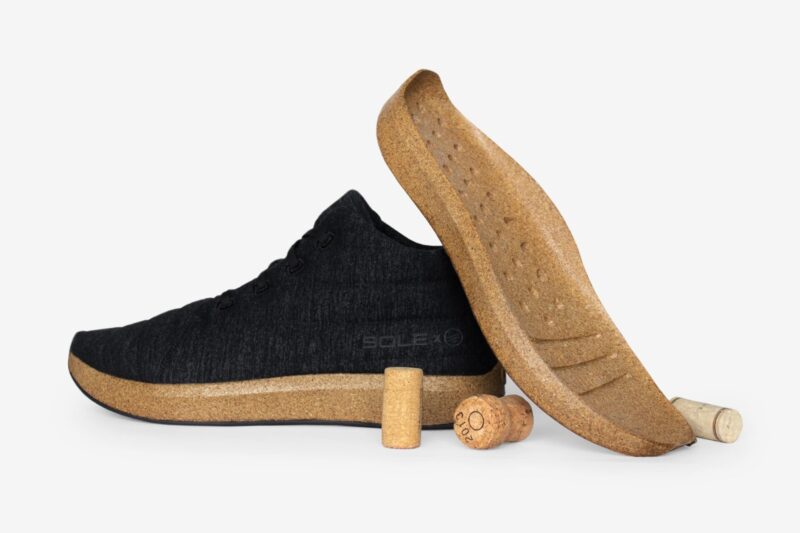How an orthopedic insole company is creating change for the better.
By Paul Maughan-Brown
Mike Baker always loved running. Like so many who live in Vancouver BC, he would take to the seawall, streets and trails to get his heart pumping and clear his head. In the 90’s Mike suffered a back injury that replaced the familiar, voluntary, enjoyable discomfort of running with constant and debilitating pain. During his recovery, doctors prescribed Mike orthotic insoles. These made a big difference to the pain, but they were rigid underfoot, not exactly comfortable, and exorbitantly expensive. A pair of prescription orthotics can cost hundreds of dollars. It’s an expense that the majority of people find very difficult to come to terms with, if they can afford it at all.
Mike set out to provide people with an alternative that could offer the same relief he’d enjoyed, at a fraction of the cost. The result was the first SOLE footbed: an over-the-counter insole that can be custom molded to your feet using a regular home oven. Since SOLE launched in 2001, the company’s products have helped bring affordable, pharmaceutical-free pain relief and comfort to millions of customers. It’s an impact that might seem minor in the scope of global issues, but to those who suffer from conditions like plantar fasciitis, it can make a radical Improvement to quality of life.
So what does all this have to do with wine corks?
From the outset, Mike knew that he wanted to create products that would have a positive impact and leave a lasting legacy, not just on individual lives, but on the planet too. His attention initially focused on packaging. Was there a better design than a standard box? Were there materials that would have a lower impact? Those who know Mike might describe him as anything from ‘passionate’ to ‘mildly obsessive’. Still, even he takes breaks.
During a weekend gathering of families at a friend’s seaside cabin, Mike had something of a eureka moment. Amid the chaos of children and pets, late nights, spilled wine, and waking up barefoot on chilly mornings, one thing stood out to him. The beautiful natural cork floor; the same floor that had been installed when the house was built more than 60 years ago. The floor that resisted 60 years of dog hair, sand, salt and stains; that kept the downstairs noise downstairs while the children slept above; that kept the warmth in and the cold out. His admiration for the floor led to a simple question: could insoles be made from cork?

It didn’t take much research to reveal the truth about cork that few people are aware of. It’s one the most sustainable natural materials that people have ever learned to utilize. Cork comes from the bark of cork oak trees that grow in Mediterranean Europe and North Africa. The bark is harvested once every nine years without harming the tree. Not only does the tree remain standing, but harvesting it actually extends the lifespan of the tree from around 75 years to upward of 200 years. On top of this, the freshly harvested tree must boost its carbon consumption by up to five times to regrow the bark that has been harvested.
The result is that natural cork is worth 55 times its weight in carbon dioxide removed from the atmosphere by the forests in which it grows.
Of course, people didn’t know all this when they first started using corks to stop bottles of wine, or as a building material, or to keep the worm on the end of their fishing line bobbing at just the right depth. Cork also has a suite of characteristics that make it incredibly versatile in its use. It’s lightweight, shock resistant, naturally antimicrobial, thermal insulating, buoyant and resistant to rot. These characteristics make cork the perfect material to make insoles from. .
Any wine drinker will know the sense you get when you pop a real cork from a bottle. The sense that something about that cork is special; too special to throw it away. But corks aren’t recyclable in regular recycling streams, and you can only collect so many before they get in the way. In 2008 Mike and SOLE launched ReCORK to save natural corks from ending up in landfill. The program quickly grew to become the largest of its kind in North America, and now has thousands of collection partners across the continent.
Since launching, ReCORK has collected more than 132 million wine corks. SOLE has successfully produced recycled cork footbeds since 2016. Thanks to natural cork’s incredible carbon-trapping qualities, these footbeds are completely carbon-negative. Growing the cork used to make the footbeds removes more carbon from the atmosphere than is produced through production, transport, storage and customer use (heating up the oven to custom mold the footbeds) put together.
While this achievement makes a difference to reducing SOLE’s own environmental impact, they see the potential for cork spreading much further through the footwear industry. ReCORK has a dedicated R&D team in Portugal, the homeland of cork production. This operation has recently produced a completely new material through reinventing the process for recycling cork. This breakthrough material offers functional characteristics previously considered impossible with cork. It is more flexible, durable and cushioning than any other cork on the market, while still being a carbon-negative compound.
The dream for Mike and his team is to make the incredibly carbon-intensive synthetic foams so ubiquitous in footwear, obsolete. But short of that they hope to set an example for what can be achieved when people prioritize innovation around utilizing the sustainable materials available in nature. This month, more than fifteen years after ReCORK was founded, part of Mike’s dream is being realized with the launch of the Jasper Chukka: the first ever shoe to feature the new ReCORK Recycled Cork midsole.

HOW YOU CAN CREATE IMPACT:
When choosing wine, shop local first. Second to that, choose bottles with a real cork rather than a screw cap. Manufacturing aluminum caps takes 24 times more carbon emissions than producing cork stoppers. Plastic, fake ‘corks’ are better than screw caps, but still nine times worse than natural cork.
 SIGN UP to become a ReCORK Collection Partner. Any business or organization can sign up to recycle corks with ReCORK. You can collect corks from the public, or simply recycle the corks you use as part of your business.
SIGN UP to become a ReCORK Collection Partner. Any business or organization can sign up to recycle corks with ReCORK. You can collect corks from the public, or simply recycle the corks you use as part of your business.
 SHARE : If you, or someone you know, suffers from foot pain, tell them about SOLE footbeds. You could save them hundreds of dollars or untold suffering.
SHARE : If you, or someone you know, suffers from foot pain, tell them about SOLE footbeds. You could save them hundreds of dollars or untold suffering.
 CONSIDER shifting the way you think about shopping for footwear.
CONSIDER shifting the way you think about shopping for footwear.
The footwear industry produces more than 24 billion pairs of shoes per year, accounting for 700,000,000 metric tons of CO2. Many of those shoes rely heavily on carbon-intensive synthetics, and will end up in landfills. Choose versatile, durable footwear.
>> If you're in Vancouver, BC, and interested in learning more about SOLE, come to the Brands for Better Community Meet-Up on Tuesday February 20th.
Paul Maughan-Brown, Content Manager at SOLE Footwear and ReCORK will speak to how and why a relatively small Vancouver-founded footwear brand has the right to make grand claims of radical change.